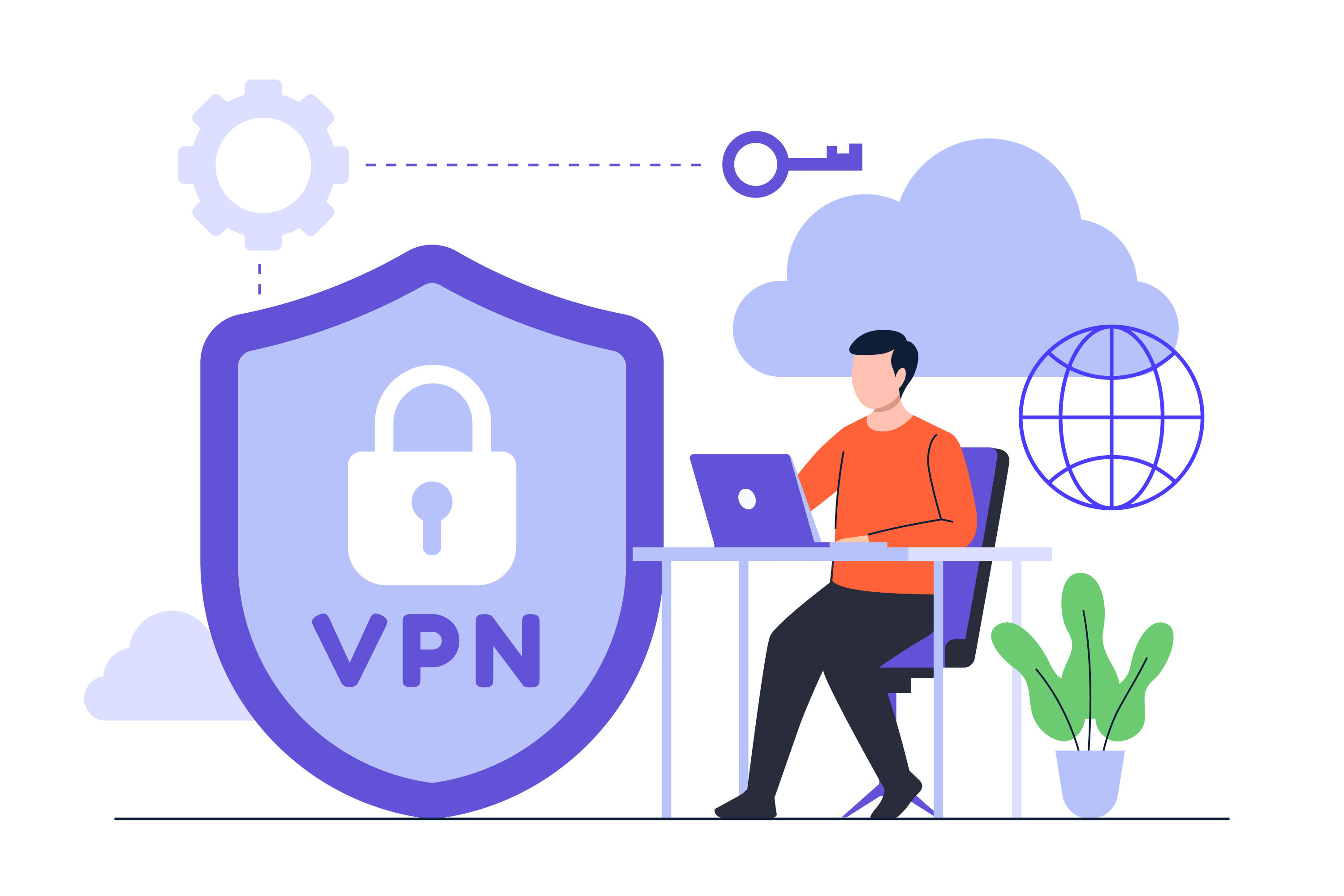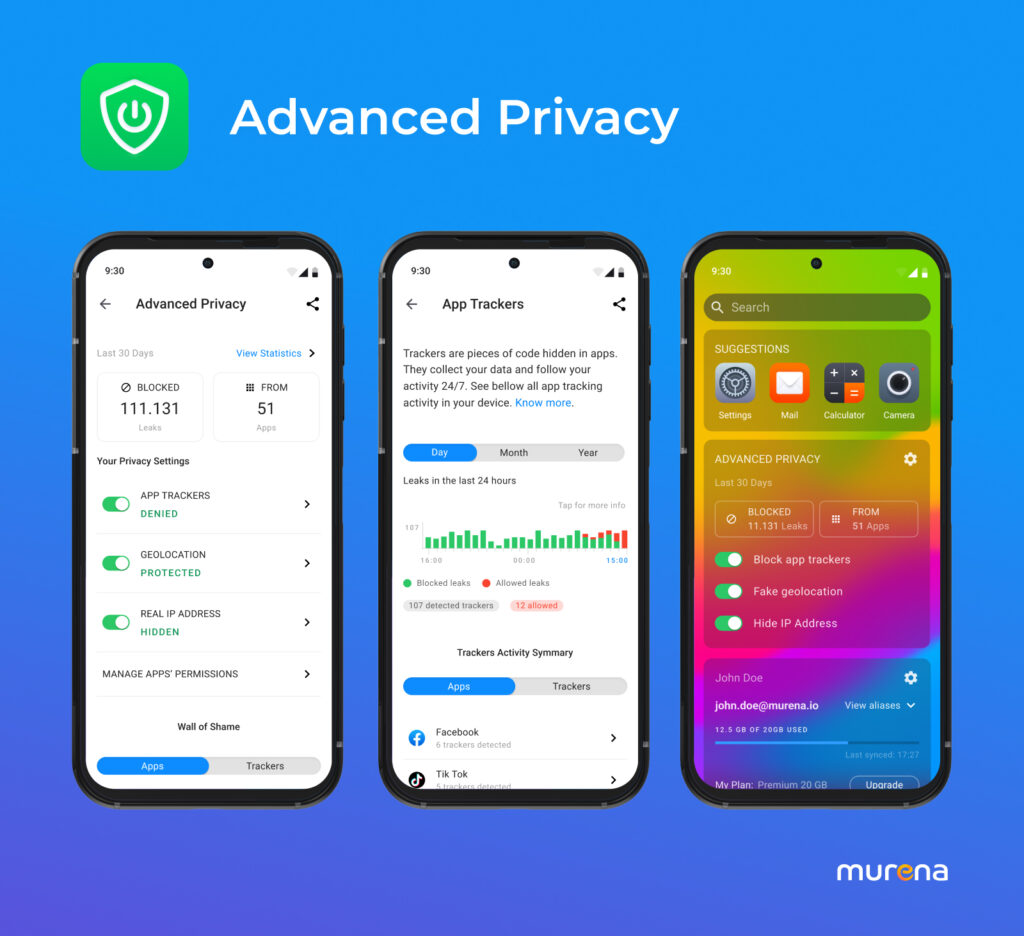
What is a VPN (virtual private network)?
Curious what a virtual private network (VPN) or a mobile VPN is – and how it protects your privacy online? Find out if these privacy tools are the right choice for your digital life!
VPNs as privacy tools: How do they protect me online?
Picture slipping your secret love letter into a sealed envelope, then handing it to a trusted courier. Only the courier knows who it’s really for. The recipient sees it came from the courier’s office – not from you. And anyone watching from the outside just sees you talking to that courier. Mysterious, right?
That’s what a VPN does in the digital world. It puts your secret online message in an encrypted envelope and sends it through a private tunnel – one that only you, your trusted recipient and the VPN provider (the mysterious courier) can access.A VPN is a privacy tool that hides your real internet connection and any personal data from local networks. It masks your IP address – your digital location – and can even make it look like you’re browsing the internet from a different country.
How does a VPN work?
When you browse the internet, your device sends data to websites – and receives data back. Normally, that data travels openly through your internet provider, and the websites you visit can see your real IP address.
When using privacy tools such as a VPN or mobile VPN, your IP address cannot be determined, because it is replaced.
Here’s how it works:
- Websites don’t see your real IP address; they see the VPN server’s IP address instead.
- It looks like you’re browsing from wherever that VPN server is located, which can help with geo-blocked content.
- Your internet traffic is encrypted between your device and the VPN server. This means your local network (like your Wi-Fi provider or employer) can’t see what websites you visit or what you’re doing – but your VPN provider can, unless they have a strong no-logs policy.
So in one sentence: A VPN – or a mobile VPN on your phone – hides your real location and protects your online activity from local observers, but it doesn’t grant full anonymity.
Does a VPN protect me from cyberattacks?
Routing a user’s internet traffic through a VPN to a different IP address doesn’t make data storage itself more secure. What a VPN actually provides is an encrypted tunnel between your device and a VPN server, protecting the transmission from interception. This can be especially helpful on public networks, such as in cafés, airports, or hotels, where the risk of cyberattacks is elevated. A VPN then helps users to stay more discreet.
However, encryption and IP masking do not create a true security barrier. Historically, organizations used VPNs as gateways to internal IT systems. This “old-school” security model is gradually being replaced by modern approaches: systems today are expected to be secure by design, not reliant on a VPN for protection.
So, again – do VPNs protect me from cyberattacks?
The answer is that they can help protect your data in transit, but they do not shield you from threats like malware, phishing, or vulnerabilities in the software or hardware you’re using.
VPN vs mobile VPN: What’s the Difference?
A mobile VPN is specifically designed for mobile devices such as smartphones and tablets. It offers the same basic privacy and security features as a traditional VPN (hiding your IP address and securing your traffic), but it’s optimized for mobile use. What makes it different is that some mobile VPNs can maintain a continuous, encrypted connection even when the underlying network changes, so you don’t have to reconnect manually each time.
Just note: not all VPN apps do this well. Some drop the connection or leak data briefly during the switch. That’s why it’s important to choose a trustworthy provider that explicitly supports seamless handover and has leak protection built in.
Talking about a trustworthy provider: this might be the most challenging part of your work, when choosing a VPN.
According to a study referenced by TorrentFreak, up to 38% of tested VPN apps contained some form of malware. Many of these were free services that claimed to offer privacy, but secretly tracked users or even sold their data.
That’s why it’s critical to choose a reputable VPN provider. In general, free VPNs come with hidden costs: they may inject ads, log your activity, or compromise your security to fund their business. Paid VPNs are more likely to invest in real encryption, transparent policies, and independent audits.
For users seeking maximum anonymity, tools like Tor go a step further by routing your traffic through multiple encrypted layers – though they often come with slower speeds and limited compatibility.
So before you hand off your digital “love letter”, make sure you know which courier you’re trusting and what they’re allowed to do with the envelope.
What are common problems when using a VPN?
While VPNs offer security during data transmission, they can also slow things down or cause connection issues, especially if the server is far away or overloaded. Maybe you’ve already had trouble accessing certain online tools – pages loaded slowly or didn’t load at all!?
In some cases, a VPN can even block access to shared documents or internal online tools, if it interferes with authentication or routing. That means team members may not be able to edit a digital file or log into a system, simply because the VPN thinks they’re in the “wrong” location or tries to block certain online traffic.It’s not that the VPN is broken. Modern services are simply very location- or connection-sensitive, and VPNs need to be configured carefully to avoid these hiccups.
Who should use a VPN?
A VPN can be useful for both professional and private use – for very different reasons.
Professional use of a VPN
In a professional context, VPNs are quite common in branches like e-commerce, finance or healthcare, when working with sensitive customer or payment information. Especially when accessing admin panels, analytics tools or internal systems over public or shared networks, a VPN adds a layer of protection. Data is encrypted during transmission and remote teams can work together more securely.
Private use of a VPN
For private users, a VPN can help bypass geo-restrictions: Travelers and expats continue to watch their favorite series, even if they’re normally not available in their new country. Influencers on social networks can expand their audience by hiding their location.
In some regions, VPNs can also help bypass DNS-based restrictions, such as website bans or content filtering imposed by governments. Certain websites are blocked by preventing your device from finding their real address. Since a VPN uses its own DNS system, it can route around these blocks. Some VPNs can also block trackers at the network level, enhancing privacy across devices.
Do I need a VPN?
Not everyone needs a VPN in their daily life. If you:
- Rarely use public Wi-Fi,
- Don’t handle sensitive data online,
- And are fine with the online content available in your country,
then you’re probably okay without one.
A VPN isn’t a must-have for everyone – it’s more of an extra layer for people who need more anonymity during data transmission or access to location-restricted content.
What are alternatives and compliments to a VPN?
A VPN is just one piece of the privacy puzzle. To strengthen your protection, it’s a good idea to also:
- use a modern browser with hardened privacy settings (like Firefox or Brave),
- install a reliable tracker/ad blocker (such as uBlock Origin),
- and be aware of DNS, IPv6, or WebRTC leaks, which can expose your identity even with a VPN.
Features like split tunneling, kill switches, and jurisdictional privacy laws also play a major role in whether your VPN setup is truly secure.

For users looking for an integrated privacy solution, the privacy-focused operating system /e/OS – available on Murena devices – offers tools like tracker blocking, Tor-based IP masking, and encrypted cloud storage.
With /e/OS you can not only fake your position, but also hide your IP address. For added protection, Murena Workspace now includes Murena Vault, which is an end-to-end encryption solution powered by CryptPad. Your data is secured with a separate Vault password known only to you, ensuring that only you can access your sensitive information. At the same time, Murena Vault allows secure and easy sharing within your company through CryptPad’s collaboration features.
While /e/OS doesn’t replace a VPN for every use case, it is definitely a strong foundation for everyday digital privacy – especially for users looking to reduce tracking and surveillance by big tech platforms.
Want to know more?
Discover the new and improved /e/OS 3.0 features – such as Advanced Privacy or Murena Vault.


3 Comments
For several years I have used a VPN through Bitdefender and once it is set up you rarely know that its even there… protecting whatever your communicating about. Its even silently connecting to the internet when you turn on the device.
I`m using WG Tunnel, that disables the VPN when I`m in my Home-Wifi. This allows to use my Home-Services like Nextcloud, HomeAssistant, PiHole … while beeing Away.
MullVad and Mozilla VPN (same technology and share servers) are the most private VPN we have now.
and maybe some local VPN provided by associative ISP like French Data Network (FDN).